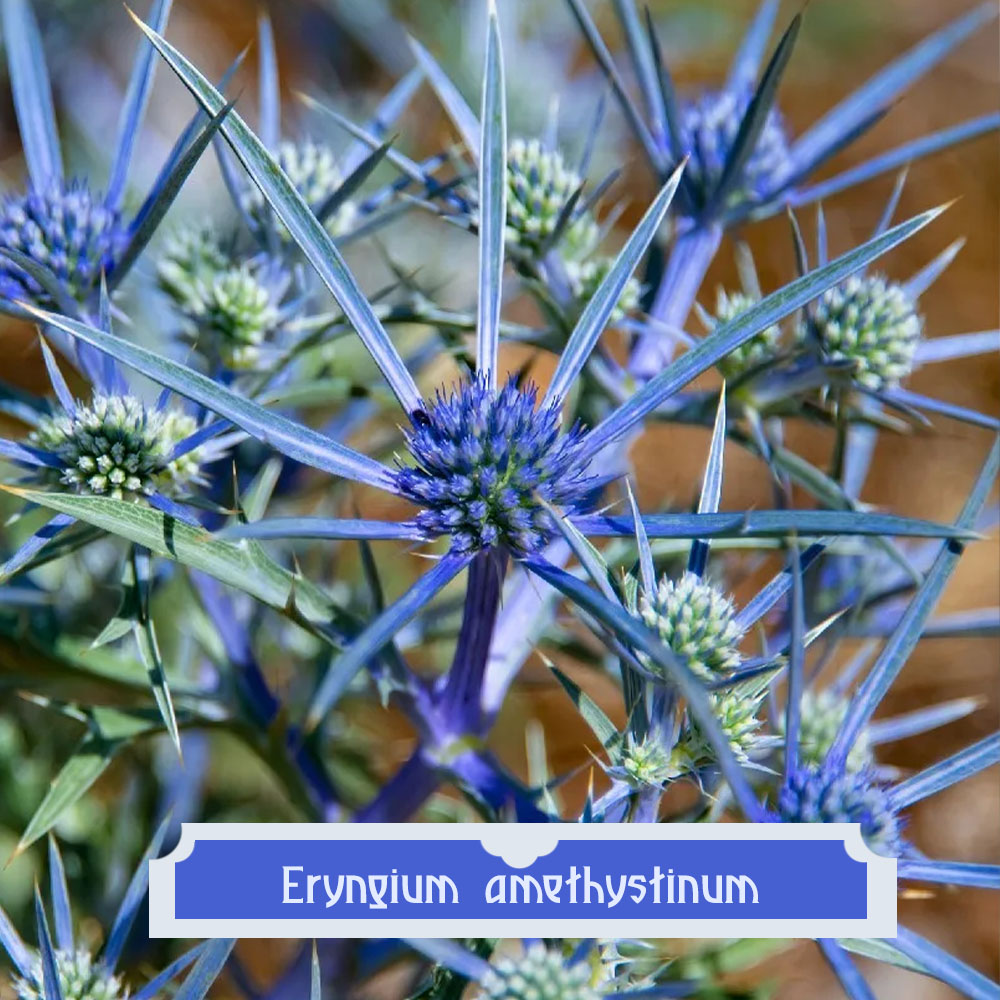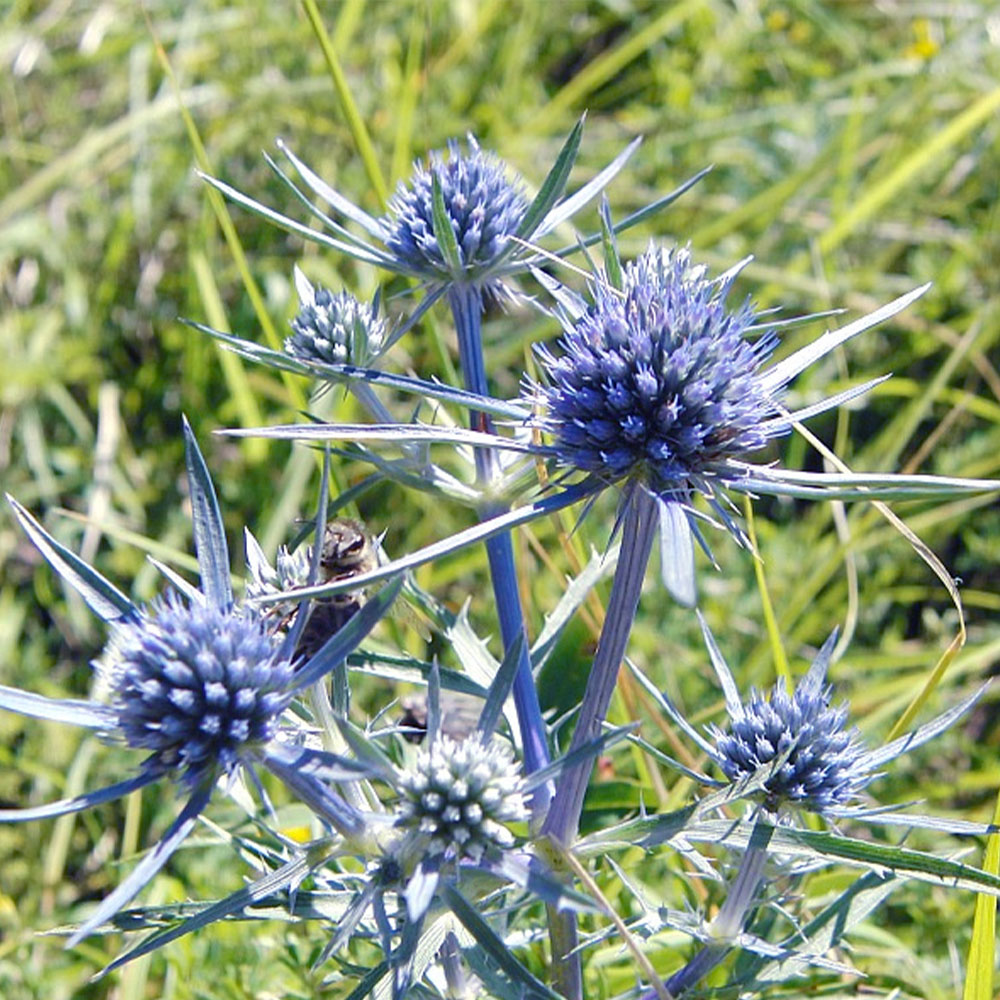No products in the cart.
Eryngium amethystinum
A striking perennial with metallic blue to violet flower heads and silvery, spiny foliage
Rated 0 out of 5
0 customer reviews
4,90 € – 15,00 €Price range: 4,90 € through 15,00 €
Tags: aromatique, bouquets, couleur, evergreen, feuillage persistant, graphique, Jardin Méditerranéen, longue floraison, Mediterranean, pepiniere lhoumois, secheresse, soleil, vivace, vivace en pot, xeriscaping
SKU: pda386
Category: Bees and Butterflies, Bouquet, Frost Hardy, Ground Cover, Make it Pop, Rewild

Eryngium amethystinum
4,90 € – 15,00 €Price range: 4,90 € through 15,00 €
Eryngium amethystinum, commonly known as the Amethyst Sea Holly, is a striking perennial with metallic blue to violet flower heads and silvery, spiny foliage that brings an architectural elegance to summer gardens.
The leaves are glossy, thick and somewhat leathery, in the mid-green tones. There is a slight metallic reflection to them and fine spines on the edges of the leaves if you peer closely.
The flowers are borne on upright, branching stems, gathered into spherical or domed blue-toned heads, and are typically surrounded by striking bracts in shades of blue, mauve, purple, white, or green, cut and spiny.
It may resemble a type of thistle to some, but the powerful blue color and the graphic shape of these flowers sets it in another aesthetic category.
The fact that it holds its color for many months after being cut also makes it a stunning addition to any dry bouquet.
These plants are hardy and undemanding, with excellent drought tolerance.
They are ideal for gravel gardens, rockeries, wildflower meadows, borders, and the front of flowerbeds or mixed English-style borders
👨🌾GARDENING TIP👨🌾: Eryngium amethystinum
-
- ✂️ Cut back dry stems in late winter.
- 🪰 All sea hollies live longer in soils that are not too rich > they thrive in poor soils, even gravelly, sandy, dry, or calcareous, as long as drainage is excellent.
- 🏠 Avoid transplanting once established, as their roots are fragile and break easily. If division is necessary, it should be carried out with great care.
🌱🌿pdA Garden Buddy Suggestions🌱🌿 :
The Tales & The Botany: Eryngium amethystinum
The name Eryngium comes from the Greek Eryngion, given to this plant by the philosopher, naturalist, and botanist Theophrastus.
The best known species in the Eryngium family is Eryngium maritimum, the sea holly.
It is considered a protected plant in France as its survival is threatened by trampling.
Its value is unique – a high tolerance to salinitiy in the air, an ability to develop and flourish in poor soils thanks to a deep tap root system – Eryngium maritimum helps stabilize coastal sand dunes.
There was also a time when the roots of this species, rich in iron and other minerals, were candied after peeling or used to flavor sweets, somewhat like marshmallow. Apparently it’s sweet? I cannot speak to this, I haven’t tried it yet!
Other Names
Amethyst eryngo
Italian eryngo
Amethyst sea holly
Origin
Eastern Mediterranean
| Weight | 0,5 kg |
|---|---|
| Flower Color | 🔵 Blue |
| Flowering | June, July, August, September |
| Exposure | Full Sun |
| Frost Tolerance | -10°C to -15°C |
| Size | 0.3m H x 0.3m W |
| Soil | Dry, Poor, Sandy, Well-Draining |
| Planting Season | March to May, September to November |
| Container Size | 9×9 cm, 2L |
Reviews
0
Rated 0 out of 5
0 customer reviews
5
0
4
0
3
0
2
0
1
0
Only logged in customers who have purchased this product may leave a review.
You may also like…
Artemisia absinthium Lambrook Silver
A highly fragrant, beautifully silver-grey bush with soft leaves and yellow flowers.
A highly fragrant, beautifully silver-grey bush with soft leaves and yellow flowers.
Rated 0 out of 5
Helichrysum italicum
An evergrey, fragrant perennial that will bring a distinctly Mediterranean atmosphere.
An evergrey, fragrant perennial that will bring a distinctly Mediterranean atmosphere.
Rated 0 out of 5
Cistus nigricans
A bush with dark green fragrant leaves that smell of summer
A bush with dark green fragrant leaves that smell of summer
Rated 0 out of 5
Euphorbia myrsinites
Known for its draping form of silver-gray foliage and radiant blooms.
Known for its draping form of silver-gray foliage and radiant blooms.
Rated 0 out of 5
Ballota pseudodictamnus
An unusually soft, grey flowering plant from the mint family.
An unusually soft, grey flowering plant from the mint family.
Rated 0 out of 5
Related Products
Trachelospermum asiaticum ‘Ogon Nishiki’
Jasmine with colorful foliage and lovely white flowers in summer
Jasmine with colorful foliage and lovely white flowers in summer
Rated 0 out of 5
Potentilla anserina
A distinctly silvery, silky and lacy perennial.
A distinctly silvery, silky and lacy perennial.
Rated 0 out of 5
Tanacetum densum subsp amani
A shrublet composed of soft, finely divided silvery gray-white leaves.
A shrublet composed of soft, finely divided silvery gray-white leaves.
Rated 0 out of 5
Mentha x piperita ‘Chartreuse’
A spicy mint, known for its use in the production of liqueurs and herbal teas.
A spicy mint, known for its use in the production of liqueurs and herbal teas.
Rated 0 out of 5
Hieracium maculatum Leopard
A native perennial with blue-green leaves and a tall yellow flower
A native perennial with blue-green leaves and a tall yellow flower
Rated 0 out of 5
Tradescantia Blushing Bride
Gorgeous blushes of pink and white that appear in the coldest nights.
Gorgeous blushes of pink and white that appear in the coldest nights.
Rated 0 out of 5
Cerastium tomentosum var. columnae
A grey-green spreading ground cover from the mountains.
A grey-green spreading ground cover from the mountains.
Rated 0 out of 5
Sedum album
A low, multi-color ground cover.
A low, multi-color ground cover.
Rated 0 out of 5
Erigeron kavinskianus
A daisy-like carpet of flowers
A daisy-like carpet of flowers
Rated 0 out of 5
Melissa officinalis
A perennial plant in the mint family that is adored by bees, royal families and tea drinkers.
A perennial plant in the mint family that is adored by bees, royal families and tea drinkers.
Rated 0 out of 5
Artemisia Valerie Finnis
A semi-evergreen, aromatic variation on the theme of Artemisia.
A semi-evergreen, aromatic variation on the theme of Artemisia.
Rated 0 out of 5
Hellebore argutifolius
Winter flowering perennial with marbled blue-green leaves
Winter flowering perennial with marbled blue-green leaves
Rated 0 out of 5
Euphorbia cyparissias Clarice Howard
A Euphorbia that resembles a soft little cyprus tree
A Euphorbia that resembles a soft little cyprus tree
Rated 0 out of 5
Glechoma hederacea
A sweet smelling ground cover, producing little blue flowers all summer long.
A sweet smelling ground cover, producing little blue flowers all summer long.
Rated 0 out of 5
Echinacea purpurea
A perennial with purple flowers all summer long
A perennial with purple flowers all summer long
Rated 0 out of 5
Stachys byzantina
Silky white-grey leaves and tall striking flowers
Silky white-grey leaves and tall striking flowers
Rated 0 out of 5
Vinca minor
Looping elegance and ability to form a low flowering ground cover
Looping elegance and ability to form a low flowering ground cover
Rated 0 out of 5
Delosperma cooperi
A dwarf perennial known for its vermillion colored flowers
A dwarf perennial known for its vermillion colored flowers
Rated 0 out of 5
recent view product
Chrysanthemum Mei Kyo
A perennial with pink double pom-pom flowers
A perennial with pink double pom-pom flowers
Rated 0 out of 5
Sedum Matrona
Big round leaves and soft pastel-pink flowers on long purple stems that flower for months.
Big round leaves and soft pastel-pink flowers on long purple stems that flower for months.
Rated 0 out of 5
Vinca major
A trailing vine, spreading along the ground to form dense masses of groundcover, come sun, come shade.
A trailing vine, spreading along the ground to form dense masses of groundcover, come sun, come shade.
Rated 0 out of 5
Sedum ‘Chocolate Cherry’
Blue-green fleshy oval leaves and pink, raspberry flowers in the fall
Blue-green fleshy oval leaves and pink, raspberry flowers in the fall
Rated 0 out of 5
Aquilegia vulgaris Leprechaun Gold
A light for dark corners – marbled with gold foliage.
A light for dark corners – marbled with gold foliage.
Rated 0 out of 5























































There are no reviews yet.